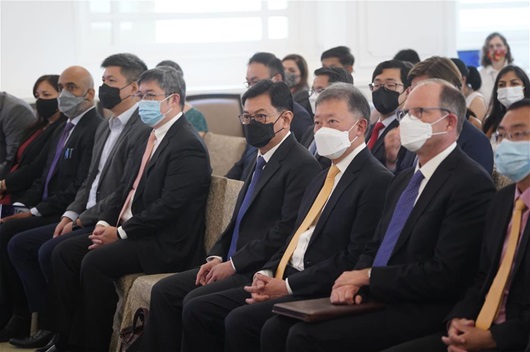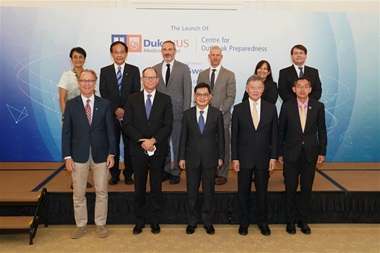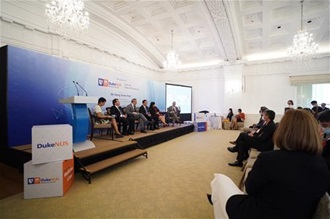Back
Friday, 10 Jun, 2022
Duke-NUS launches new centre to strengthen expertise and capacity and in advancing pandemic preparedness across ASEAN
Leveraging the research, collaborations and commercialisation successes that have contributed to Singapore’s fight against the COVID-19 pandemic, Duke-NUS today launched a new centre to further strengthen regional research capacity, cooperation and preparedness against future pandemics and public health threats. Deputy Prime Minister and Coordinating Minister for Economic Policies Heng Swee Keat joined some 100 guests at the launch of the Centre for Outbreak Preparedness or COP. The launch, held at the Fullerton Hotel, was followed by a panel discussion on enhancing regional capacity to predict, prepare and respond to future health threats.

Among the guests were Duke-NUS Governing Board Chairman Mr Goh Yew Lin as well as members of the board, benefactors, partners and leaders from across the biomedical, healthcare and other sectors.
After welcoming the guests, Duke-NUS Dean Professor Thomas Coffman said, “Duke-NUS is proud to contribute to Singapore’s decisive and effective actions to fight COVID-19. And now, as we are emerging from the pandemic, it is important that we remember the lessons we learnt over the past two plus years and use these to prepare for the next one.”
“It is in this spirit that we conceptualised the Centre for Outbreak Preparedness,” added Prof Coffman.
Introducing the new Centre, its director Professor Paul Pronyk highlighted that the Centre will leverage Duke-NUS’ strong partnerships around the world, with particular focus on research institutes in South and Southeast Asia to increase the region’s research capacity and capabilities.
In addition to its close ties with Duke-NUS’ parent university, the National University of Singapore, the Centre will also work closely with Singapore government agencies and key partners such as Singapore’s National Programme for Research in Epidemic Preparedness and Response (PREPARE), A*STAR’s Bioinformatics Institute (BII), the National Centre for Infectious Diseases (NCID) and the World Health Organisation (WHO).
“If the pandemic has taught us anything, it is that we are interdependent and that we are strongest when we are working together. Partnerships between institutions, between countries, between continents are the crux and core mission of COP,” said Prof Pronyk.
With many zoonotic threats concentrated in the region, the strategic location of the Centre in Singapore provides proximity to this global hotspot and will help address a specific need for timely access to genetic data of the pathogens that pose disease threats.
One study that addresses the need for better genetic surveillance is the Asia Pathogen Genomics Initiative (PGI), a collaboration between Duke-NUS and the Bill & Melinda Gates Foundation. This initiative is expanding genomic sequencing capacity across 11 countries in South and Southeast Asia by building capacity and a collaborative platform for policymakers, researchers and public health specialists across the region.
“Because pathogens are not contained within borders, so our collaborations should not be either. It is great news that some of our partners in the Africa PGI will be providing technical support to the Asia PGI that will help ensure that both of them are learning from one another’s experiences, building a shared body of best practices and lessons,” said Dr Suzman.
Speaking on behalf of the WHO via pre-recorded video message, South East Asian Public Health Laboratory Scientist Ms Dhamari Naidoo said, “I am pleased to say that the WHO is delighted to support the launch of the Duke-NUS Centre for Outbreak Preparedness as well as the Asia Pathogen Genomics Initiative and we look forward to closely working together with the Asia PGI to support our member states in their national planning for the integration of genomic surveillance for enhanced health security across South and Southeast Asia.”

With the Centre launched, the speakers, DPM Heng as well as the panellists and moderator Senior Health Correspondent at The Straits Times Ms Salma Khalik commemorated the opening with a group photo.
The floor was then handed to Ms Khalik for the panel discussion, which saw the five panellists discuss issues including the need to improve laboratory capacity to study pathogens with pandemic potential, enhance methods for early detection, accelerate innovations in diagnostics, vaccine and therapeutics research and development, and support health system capacity for managing outbreaks.
In addition to Prof Pronyk, the panel consisted of Dr Sebastian Maurer-Stroh, BII Executive Director; Dr David Blazes, Deputy Director for Genomics, Epidemiology and Modelling at the Bill & Melinda Gates Foundation; Professor Wang Linfa, Executive Director of PREPARE; Ms Anita Suresh, Deputy Director for Genomics & Sequencing Programme with the Foundation for Innovative New Diagnostics or FIND.
 After the insightful and frank panel discussion, Dean of NUS’ Saw Swee Hock School of Public Health Professor Teo Yik Ying brought the stage programme to a close. Prof Teo highlighted three reasons why he considers the establishment of a Centre for Outbreak Preparedness in this part of the world to be highly important.
After the insightful and frank panel discussion, Dean of NUS’ Saw Swee Hock School of Public Health Professor Teo Yik Ying brought the stage programme to a close. Prof Teo highlighted three reasons why he considers the establishment of a Centre for Outbreak Preparedness in this part of the world to be highly important.
The hotspot-nature of South and Southeast Asia for new emerging infectious diseases and the re-emergence of old threats, the continent’s susceptibility to global megatrends such as rapid urbanisation as well as the lack of a trusted global agency in this part of the world that can provide the necessary oversight.
“These three reasons mean that there is potentially a perfect storm waiting to happen in Asia, in the form of the rise of a highly pathogenic virus or bacteria that is either completely novel, or completely resistant to existing medicines and technologies,” he said, adding that he is excited to see COP “establish itself as a regional centre for excellence, as an important step where Singapore is able to contribute to the surveillance of pathogenic threats in the world.”
After the closing remarks, guests continued to discuss the challenges ahead during a networking session which brought the event to an end.